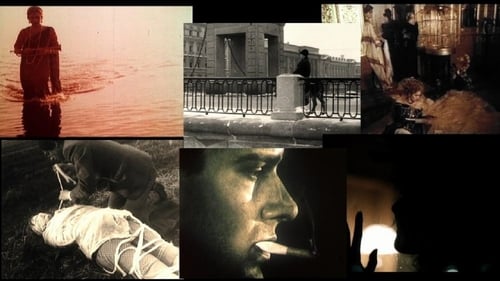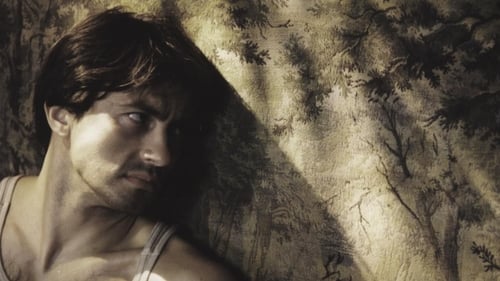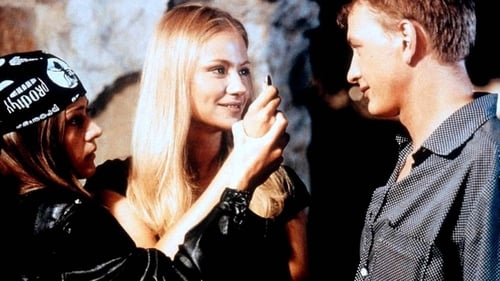
Director of Photography
A fascinating story about three teenagers who found an ancient medallion of the Teutonic Order in the basements of a former German hospital in Kaliningrad (formerly Konigsberg). A story that gradually develops into a dangerous and mystical adventure, with chases, struggle, constant risk. The children will have to solve the mystery of the amber medallion, find the treasure, save the girl and make their choice. And, of course, this is a film about the first youthful love.

Director of Photography
According to Egyptian mythology, Ka is a life force that exists separately from its “master”. These are not the people themselves, but their materialized souls. On the one hand, this is a story about how the ancient Egyptian Pharaoh Akhenaten transmits his Ka to the main character, the Poet. On the other - the love story of Leyli and Medlum, the heroes of the poem of the same name of Khlebnikov. Like the eastern and western stars, they are found in the sky.

Director of Photography
A man goes to search fuel for a broken-down tractor. But all around there is only the desert, grass and wind. To get the tractor to work, the hero starts a fight with an indifferent nature. When an energy source is found, the 20th century begins.

Director of Photography
They met in Crimea as enemies: the slaughterman Fedor, disappointed in life, and Katya, a former prisoner, deprived of maternity rights, who became a foreigner in her homeland. Sometimes grief unites.

Director of Photography
At the turn of 80-90, film director Alexei Yurievich German created a film workshop for the first film, which became famous for the paintings of young debutant directors, who later became famous masters. The film tells about how the Master selected talented directors, helped them take the first step and find themselves in the cinema. The TV version of the film.

Director of Photography
The Brothers Karamazov novel is the epitome of Fyodor Dostoevsky’s creative work, the acme of the philosophic investigation carried out by this colossal and restless mind throughout his life. World renowned choreographer Boris Eifman offers a remarkable vision of the core ideas within the novel, expanding upon them though body language as a way of exploring the origins of the moral devastation of the Karamazovs; creating through choreographic art an equivalent of what Dostoyevsky investigated so masterfully in his book, the excruciating burden of destructive passions and evil heredity. This ballet production is also known and performed as Beyond Sin.

Director of Photography
The intersecting destinies of three people — a Moroccan-Iraqi writer searching for his brother, the lover whom he left behind, and a young orphan on the run — create an incisive and unsettling portrait of a land riven by violence and fundamentalism.

Director of Photography
In 1982, filmmaker Ekaterina Eremenko was among 26 students accepted into Russia’s elite natural science school. A golden future lay ahead of them, but the birth of perestroika and the collapse of the old order meant that that future was no longer certain. Eremenko sets out to discover what happened to her classmates and how the seismic political changes of the 1980s affected her generation. (Storyville)

Director of Photography
Elderly Aleksandra visits her Russian soldier grandson, Denis, at the Chechen war front, providing comfort as she tours his army. All the while, Denis ponders the reason for her unexpected appearance.

Director of Photography
Set in 2002, an abandoned 5-year-old boy living in a rundown orphanage in a small Russian village is adopted by an Italian family.

Camera Operator
Sokurov directed and filmed Mozart’s Requiem for the Rossica Choir in the wonderful hall of the St. Petersburg Philharmonic.

Director of Photography
An experimental drama about a boy and his illness, a wife looking for a site for her husband’s construction company and a beautiful girl who works on a phone sex-line.

Director of Photography
In this dreamlike film, a nameless father and his son, Aleksei, live together in an apartment in St. Petersburg. Aleksei's mother has died and consequently the two have a very close relationship. When Aleksei acquires a girlfriend, she refuses to take a back seat to his bond with his dad, and breaks up with him. Aleksei is also experiencing nightmares, dreading separation from his father to be a part of the military as his father was.

Director of Photography
The film "All the Vertovs" tells about the Kaufman brothers-David, Mikhail and Boris. All three are world-class filmmakers. Each of them managed to achieve the highest level of proficiency in the profession, each had their own vision of the world and the gift to embody it on the screen in a unique, deeply individual manner.

Cinematography
The fascinating and tumultuous lives of Mikhail, Boris and Denis Kaufman (better known as Dziga Vertov) are the focus of this powerful documentary. Using rare archival footage from Russian state film archives and private collections, the brothers' lives and art are traced from Bialystok to Moscow, Paris, and Hollywood.

Director of Photography
The beautiful Tanya returns to her small mining town, after supposedly working as a model in Moscow. She decides to marry her shy school sweetheart Mishka, who now works in the mine. The miners finally receive some pay, but Mishka still ends up with no money to buy his bride a gift, so he seeks the help of his perpetually drunk buddy Garkusha. Mishka's poor working-class family all help to put on a fine wedding with copious amounts of vodka, even though they are suspicious of Tanya's occupation in Moscow, and of her connection with her Mafia ex-boyfriend Borodin.

Director of Photography
The necrorealist science fiction plot involves a team of scientists attempting to cross a human being with a tree, and a special unit dispatched to hunt down the zombie-like mutants created in a previous, failed experiment

Director of Photography
In 1994, Alexander Sokurov accompanied Russian troops assigned to a frontier military post at the Tajikistan/Afghanistan border to film their experiences. While unnamed tribal forces occasionally engaged the troops in skirmishes, Sokurov’s haunting documentary chronicles the downtime between activity.

Director of Photography
This small film came out of the material edited for Sokurov's five-hour documentary Spiritual Voices.

Director of Photography
An anonymous man wanders through decomposing, fog-enshrouded catacombs and encounters a series of “the degraded and the humiliated,” including a holy prostitute and a Kafkaesque bureaucrat.

Director of Photography
These images and sounds are poetic metaphors that transform “Elegy from Russia” into a document that provides a emotional–historical “memory bank” for all.

Director of Photography
Via the New York Times: "...a severely obscure meditation on pre-revolutionary Russia in the form of an encounter between a ghost from the past and the ghost's present-day guardian. In fact, the two characters seem to be the shade of Anton Chekhov and the young man who tends a Chekhov museum in the Crimea, though that is never made explicit."

Director of Photography
A biologist, obsessed with the idea of writing a treatise on a new kind of mouse, becomes witness to a number of bizarre and horrific events, from his son's suicide, to the S&M engaged in by respectable middle-aged men, to his own family's psychic morbidity.

Cinematography
The second film by Sokurov featuring Boris Yeltsin as the principal character. Now he is the President of Russia, invested with power, bearing the full responsibility for the destinies of his distant compatriots as well as his closest kin and friends.

Director of Photography
Made up of footage of a protest manifestation of mothers whose children had been summoned to serve in Soviet military forces and sent to the zones of Transcaucasian conflicts.

Director of Photography
A man tries to come to terms with his father's death and to deal with the mundane details of his burial in a society cut off from spirituality.

Camera Operator

Director of Photography
In "The Soviet Elegy" the long train of photos of the Soviet leaders, dead or alive, stops at the portrait of Yeltsin. At the time of shooting Yeltsin had fallen down from the assembly of the Communist Party deities, and participated in the earthly life through connections of different kinds.

Director of Photography
As with so many early films by Sokurov, this film has two dates: the first is the date of its creation (the film was then banned), the second is the date of the final edition and legal public screening. The film consists of German and Soviet archive footage of the World War II — to be exact, from the end of the war. An attempt to make a large–scale documentary on this subject had been undertaken in the Soviet cinema of the 1960s: the film — “Ordinary Fascism” — by the outstanding Soviet film–maker Mikhail Romm had become a classic retrospective investigation of fascism. But Sokurov uses the expressive power of the documentary image in an absolutely different way. He does not amass materials for a large–scale picture of Nazi crimes.

Director of Photography
A military group of alpinists are selected to carry out a secret mission. The fate of humanity depends on their success. The rules of the mission require the death of each participant once his or her task is accomplished. After killing one of their colleagues and splitting into several groups, the alpinists continue their journey. But the human unconscious doesn’t follow military orders. Having once committed murder, the “knights” can’t control their desire to kill. They forgot their mission… and kill each other instead. —University of Pittsburgh

Camera Operator
A requiem for a Russian peasant woman, Maria Semionovna Voinova. The film is in two chapters. The first chapter consists of an impression of Maria Semionovna, scenes of the colours of summer time: hay–making, bathing in a river, work in the flax fields and a holiday in the Crimea. The second chapter, set nine years later, is in black and white and deals with how Maria Semionovna's life ended. The mood is one of a sad and elegiac narration.

Camera Operator
The picture is about the anti-Hitler coalition of the USSR, England and America, which developed as a counterweight to the aggressive policy of Nazi Germany during the Second World War. The unique newsreel footage of these years, shot by operators of different warring countries, is connected with today's thoughts of the author about the fate of the post-war world, about the humanitarian losses of both sides and about gaining unstable hopes for the unity of the world in countering evil.

Director of Photography
This bleak late soviet-era drama follows the career of Malyanov, a young medical school graduate who has been sent to work in Turkmenia. Here he runs into a hodge-podge of people of differing ethnicities, all of them victims of the government's earlier mania for relocating and eliminating whole ethnic groups and classes of people. These desperately unhappy people are unable to find any pleasure in this diverse companionship, but instead are antagonistic to it, and often resort to desperate measures in their doomed attempts to ease their pain.

Director of Photography
The manifestation and fireworks on the 1st of May, one of the ritual celebrations of Soviet times, as a gathering of tired participants of a mass scene falling into pieces without the director's orders and without any aims.

Director of Photography
A 1988 documentary film directed by Alexander Sokurov, about the later life and death of Soviet Russian filmmaker Andrei Tarkovsky. The film was originally intended to mark the 50th birthday of Tarkovsky in 1982, which would have been before his death. Controversy with Soviet authorities about the film's style and content led to significant delays in the production.

Director of Photography
Interesting short documentary on young athletes in a Soviet ice skating program, some of whom are barely past toddler age. Kinetic and up close, the doc focuses on movement with music, eschewing interview and conversation, and mostly submerging political and social commentary.


































